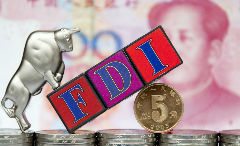FDI remains stable, dynamic
2018-08-17
China Daily
China’s foreign direct investment remained stable and dynamic in the first seven months of 2018, as the total volume grew by 5.5 percent year-on-year to $76.07 billion, the Ministry of Commerce announced on Aug 16.
From January to July, a total of 35,239 foreign-invested companies were set up in the Chinese mainland, up 99.1 percent year-on-year.
The number of newly established companies reached 5,648 in July, a 113.1 percent year-on-year increase, while FDI use topped $7.75 billion, up 19.3 percent.
FDI from Singapore, the United States, United Kingdom, South Korea and Japan grew by 23.5 percent, 12 percent, 86.1 percent, 36.5 percent and 30.6 percent year-on-year respectively, according to the ministry.
Despite the escalation of the China-US trade dispute, a senior expert said there was no reason to doubt China’s attraction to foreign investment as long as its domestic economy remains stable, therefore the country’s ongoing consumption upgrading boom and service infrastructure will remain promising to global investors.
Cheng Dawei, a professor at the School of Economics of Renmin University of China, said although the ongoing trade friction between the US and China has not had any negative impact so far, foreign capital still has confidence in China as the FDI flow remained stable.
“Both China’s productivity and consumption power will grow in the long run. Chinese consumers, led by middle-income earners, are more open to new products, especially digital ones,” she said.
According to Cheng, China’s completed infrastructure for the entire industrial chain is another competitive advantage the nation possesses that is not easy to be replaced.
“China has a well-developed supporting infrastructure for a wide range of industries with large production capacity, providing solid support for foreign investors intending to manufacture here,” she said.
“A complete industrial chain is to some extent more appealing than production capacity. For example, lighters are made in China because the nation has a complete industrial chain for everything from plastic bodies and iron parts to flints,” Cheng added.
A number of foreign companies announced new investment in China in July, including German chemical giant BASF Group’s $10 billion investment plan to build a chemical plant in Guangdong province and Tesla Inc’s move to build an electric vehicle mega-factory in Shanghai.
“China’s manufacturing capability and huge market potential will continue to attract innovation-driven companies to move to the market to commercialize their latest technologies quickly at a lower cost,” she said.


